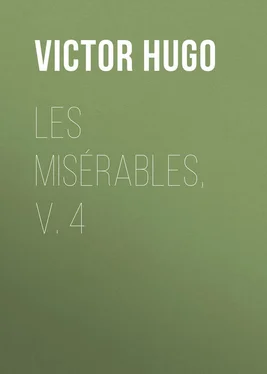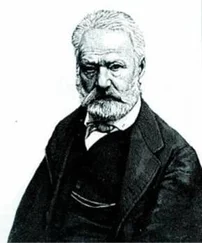Victor Hugo - Les Misérables, v. 4
Здесь есть возможность читать онлайн «Victor Hugo - Les Misérables, v. 4» — ознакомительный отрывок электронной книги совершенно бесплатно, а после прочтения отрывка купить полную версию. В некоторых случаях можно слушать аудио, скачать через торрент в формате fb2 и присутствует краткое содержание. Жанр: literature_19, foreign_antique, foreign_prose, на английском языке. Описание произведения, (предисловие) а так же отзывы посетителей доступны на портале библиотеки ЛибКат.
- Название:Les Misérables, v. 4
- Автор:
- Жанр:
- Год:неизвестен
- ISBN:нет данных
- Рейтинг книги:4 / 5. Голосов: 1
-
Избранное:Добавить в избранное
- Отзывы:
-
Ваша оценка:
- 80
- 1
- 2
- 3
- 4
- 5
Les Misérables, v. 4: краткое содержание, описание и аннотация
Предлагаем к чтению аннотацию, описание, краткое содержание или предисловие (зависит от того, что написал сам автор книги «Les Misérables, v. 4»). Если вы не нашли необходимую информацию о книге — напишите в комментариях, мы постараемся отыскать её.
Les Misérables, v. 4 — читать онлайн ознакомительный отрывок
Ниже представлен текст книги, разбитый по страницам. Система сохранения места последней прочитанной страницы, позволяет с удобством читать онлайн бесплатно книгу «Les Misérables, v. 4», без необходимости каждый раз заново искать на чём Вы остановились. Поставьте закладку, и сможете в любой момент перейти на страницу, на которой закончили чтение.
Интервал:
Закладка:
So long as Cosette was young Jean Valjean readily talked to her about her mother; but when she grew up it was impossible for him to do so, – he felt as if he dared not do it. Was it on account of Cosette or of Fantine? He felt a species of religious horror at making this shadow enter Cosette's thoughts, and rendering a dead woman a third person in their society. The more sacred this shade was to him, the more formidable was it. He thought of Fantine, and felt himself overwhelmed by the silence. He saw vaguely in the darkness something that resembled a finger laid on a lip. Had all the modesty which was in Fantine, and which during her life quitted her with violence, returned after her death, to watch indignantly over the dead woman's peace, and sternly guard her in the tomb? Was Jean Valjean himself unconsciously oppressed by it? We who believe in death are not prepared to reject this mysterious explanation, and hence arose the impossibility of pronouncing, even to Cosette, the name of Fantine. One day Cosette said to him, —
"Father, I saw my mother last night in a dream. She had two large wings, and in life she must have been a sainted woman."
"Through martyrdom," Jean Valjean replied. Altogether, though, he was happy; when Cosette went out with him she leaned on his arm, proudly and happily, in the fulness of her heart. Jean Valjean felt his thoughts melt into delight at all these marks of a tenderness so exclusive and so satisfied with himself alone. The poor wretch, inundated with an angelic joy, trembled; he assured himself with transport that this would last his whole life; he said to himself that he had not really suffered enough to deserve such radiant happiness, and he thanked God in the depths of his soul for having allowed him – the wretched – to be thus loved by this innocent being.
CHAPTER V
THE ROSE PERCEIVES THAT SHE IS AN IMPLEMENT OF WAR
One day Cosette happened to look at herself in the glass, and said, "Good gracious!" She fancied that she was almost pretty, and this threw her into a singular trouble. Up to this moment she had not thought of her face, and though she saw herself in the mirror she did not look at herself. And, then, she had often been told that she was ugly; Jean Valjean alone would say gently, "Oh, no, oh, no!" However this might be, Cosette had always believed herself ugly, and had grown up in this idea with the facile resignation of childhood. And now all at once her looking-glass said to her, as Jean Valjean had done, "Oh, no!" She did not sleep that night. "Suppose I were pretty," she thought, "how droll it would be if I were pretty!" and she remembered those of her companions whose beauty produced an effect in the convent, and said to herself, "What! I might be like Mademoiselle So-and-so!"
On the next day she looked at herself, but not accidentally, and doubted. "Where was my sense?" she said; "No, I am ugly." She had simply slept badly, her eyes were heavy and her cheeks pale. She had not felt very joyous on the previous day when she fancied herself pretty; but was sad at no longer believing it. She did not look at herself again, and for upwards of a fortnight tried to dress her hair with her back to the glass. In the evening, after dinner, she usually worked at her embroidery in the drawing-room, while Jean Valjean read by her side. Once she raised her eyes from her work, and was greatly surprised by the anxious way in which her father was gazing at her. Another time she was walking along the street, and fancied she heard some one behind her, whom she did not see, say, "A pretty woman, but badly dressed." "Nonsense," she thought, "it is not I, for I am well-dressed and ugly." At that time she wore her plush bonnet and merino dress. One day, at last, she was in the garden, and heard poor old Toussaint saying, "Master, do you notice how pretty our young lady is growing?" Cosette did not hear her father's answer, for Toussaint's words produced a sort of commotion in her. She ran out of the garden up to her room, looked in the glass, which she had not done for three months, and uttered a cry, – she dazzled herself.
She was beautiful and pretty, and could not refrain from being of the same opinion as Toussaint and her glass. Her figure was formed, her skin had grown white, her hair was glossy, and an unknown splendor was kindled in her blue eyes. The consciousness of her beauty came to her fully in a minute, like the sudden dawn of day; others, besides, noticed her, Toussaint said so; it was evidently to her that the passer-by alluded, and doubt was no longer possible. She returned to the garden, believing herself a queen, hearing the birds sing, though it was winter, seeing the golden sky, the sun amid the trees, flowers on the shrubs; she was wild, distraught, and in a state of ineffable ravishment. On his side, Jean Valjean experienced a profound and inexplicable contraction of the heart; for some time past, in truth, he had contemplated with terror the beauty which daily appeared more radiant in Cosette's sweet face. It was a laughing dawn for all, but most mournful for him.
Cosette had been for a long time beautiful ere she perceived the fact, but, from the first day, this unexpected light which slowly rose and gradually enveloped the girl's entire person hurt Jean Valjean's sombre eyes. He felt that it was a change in a happy life, so happy that he did not dare stir in it, for fear of deranging it somewhere. This man, who had passed through every possible distress, who was still bleeding from the wounds dealt him by his destiny, who had been almost wicked, and had become almost a saint, who, after dragging the galley chain, was now dragging the invisible but weighty chain of indefinite infamy; this man whom the law had not liberated, and who might at any moment be recaptured and taken from the obscurity of virtue to the broad daylight of further opprobrium, – this man accepted everything, excused everything, pardoned everything, blessed everything, wished everything well, and only asked one thing of Providence, of men, of the laws, of society, of nature, of the world, – that Cosette should love him, that Cosette might continue to love him; that God would not prevent the heart of this child turning to him and remaining with him! Loved by Cosette he felt cured, at rest, appeased, overwhelmed, rewarded, and crowned. With Cosette's love all was well, and he asked no more. Had any one said to him, "Would you like to be better off?" he would have answered, "No." Had God said to him, "Do you wish for heaven?" he would have answered, "I should lose by it." All that could affect this situation, even on the surface, appeared to him the beginning of something else. He had never known thoroughly what a woman's beauty was, but he understood instinctively that it was terrible. This beauty, which continually expanded more triumphantly and superbly by his side upon the ingenuous and formidable brow of the child, from the depths of his ugliness, old age, misery, reprobation, and despondency, terrified him, and he said to himself, "How beautiful she is! what will become of me?" Here lay the difference between his tenderness and that of a mother, – what he saw with agony a mother would have seen with joy.
The first symptoms speedily manifested themselves. From the day when Cosette said to herself, "I am decidedly good-looking," she paid attention to her toilet. She remembered the remark of the passer-by, – pretty, but badly dressed, – a blast of the oracle which passed by her and died out, after depositing in her heart one of those two germs which are destined at a later period to occupy a woman's entire life, – coquettishness. The other is love. With faith in her beauty, all her feminine soul was expanded within her; she had a horror of merinos, and felt ashamed of plush. Her father never refused her anything, and she knew at once the whole science of the hat, the dress, the mantle, the slipper, and the sleeve, of the fabric that suits, and the color that is becoming, – the science which makes the Parisian woman something so charming, profound, and dangerous. The expression "femme capiteuse" was invented for the Parisian. In less than a month little Cosette was in this Thebaïs of the Rue de Babylone, not only one of the prettiest women, which is something, but one of the best dressed in Paris, which is a great deal more. She would have liked to meet her "passer-by," to see what he would say, and teach him a lesson. The fact is, that she was in every respect ravishing, and could admirably distinguish a bonnet of Gerard's from one of Herbaut's. Jean Valjean regarded these ravages with anxiety, and while feeling that he could never do more than crawl or walk at the most, he could see Cosette's wings growing. However, by the simple inspection of Cosette's toilet, a woman would have seen that she had no mother. Certain small proprieties and social conventionalisms were not observed by Cosette; a mother, for instance, would have told her that an unmarried girl does not wear brocade.
Читать дальшеИнтервал:
Закладка:
Похожие книги на «Les Misérables, v. 4»
Представляем Вашему вниманию похожие книги на «Les Misérables, v. 4» списком для выбора. Мы отобрали схожую по названию и смыслу литературу в надежде предоставить читателям больше вариантов отыскать новые, интересные, ещё непрочитанные произведения.
Обсуждение, отзывы о книге «Les Misérables, v. 4» и просто собственные мнения читателей. Оставьте ваши комментарии, напишите, что Вы думаете о произведении, его смысле или главных героях. Укажите что конкретно понравилось, а что нет, и почему Вы так считаете.












